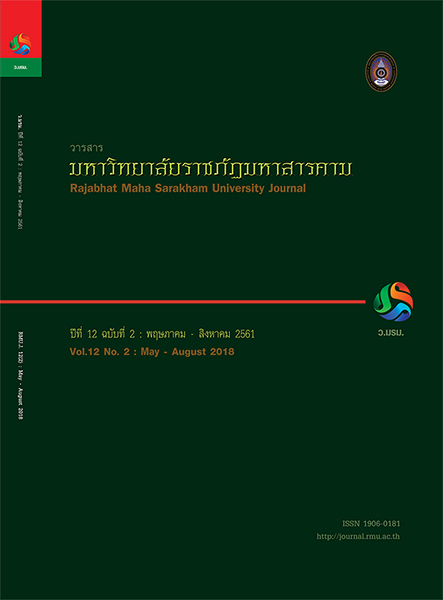ขอบข่ายการศึกษาการจัดการธุรกิจระหว่างประเทศ
Main Article Content
บทคัดย่อ
บทความนี้นำเสนอขอบเขตของการจัดการธุรกิจระหว่างประเทศ ความหมายและความสำคัญของ ซึ่งธุรกิจระหว่างประเทศหมายถึงกิจกรรมทางธุรกิจใด ๆ ที่ข้ามเขตแดนของประเทศ เช่นการเคลื่อนไหวหรือการโอนสินค้าหรือบริการ เงินทุน บุคลากรหรือเทคโนโลยี ทั้งนี้ธุรกิจระหว่างประเทศเกี่ยวข้องกับสองกิจกรรมหลัก ได้แก่ การค้าระหว่างประเทศและการลงทุนระหว่างประเทศ การค้าระหว่างประเทศประกอบด้วยทฤษฎีต่างๆดังนี้: ลัทธิพาณิชย์นิยม การได้เปรียบโดยสมบูรณ์ การได้เปรียบเชิงเปรียบเทียบ ทฤษฎีเฮคเชอร์ ออแลง และทฤษฎีวงจรชีวิตผลิตภัณฑ์ ในขณะที่การลงทุนระหว่างประเทศประกอบด้วย โลกาภิวัตน์พันธมิตรเชิงกลยุทธ์และการควบรวมและซื้อกิจการ ธุรกิจระหว่างประเทศมีความสำคัญในด้านช่วยเพิ่มโอกาสการจ้างงาน สร้างรายได้และยกระดับมาตรฐานการครองชีพของประชาชน
Article Details
1. บทความที่ลงตีพิมพ์ทุกเรื่องได้รับการตรวจทางวิชาการโดยผู้ประเมินอิสระ ผู้ทรงคุณวุฒิ (Peer Review) สาขาที่เกี่ยวข้อง อย่างน้อย 3 ท่าน ในรูปแบบ Double blind review
2. ข้อคิดเห็นใด ๆ ของบทความที่ลงตีพิมพ์ในวารสารมหาวิทยาลัยราชภัฏมหาสารคาม นี้เป็นของผู้เขียน คณะผู้จัดทำวารสารไม่จำเป็นต้องเห็นด้วย
3. กองบรรณาธิการวารสารมหาวิทยาลัยราชภัฏมหาสารคาม ไม่สงวนสิทธิ์การคัดลอกแต่ให้อ้างอิงแสดงที่มา
เอกสารอ้างอิง
[2]Boddewyn, J.J. (1999). The Domain of International Management. Journal of International Management, 5 (1), 3–14.
[3]Barba-Navaretti, G. and Venables, A.J. (2004), Multinational Firms in the World Economy, Princeton University Press, Princeton, NJ.
[4] Griffin, R.W., and M.W. Pustay. (2005). International Business, 4th Edition. Upper Saddle River, NJ: Pearson Prentice-Hall.
[5]Cullen, J.B., and K.P. Parboteeah. (2010). International Business: Strategy and the Multinational Enterprise. London: Routledge.
[6] Hill, C. W. (2014). International Business: Competing in the global marketplace. 10th Edition. New York : McGraw-Hill Education.
[7] Eden, L., Dai, L., and Li, D. (2011). International business, international management, and international strategy. International Studies of Management and Organization, 40 (4), 54-68
[8] Hitesh Bhasin. (2018). “Importance of International Business Benefits of International Business” [Online] ttps://www.marketing91.com/importance-international-business/
[9]Boddewyn, J.J. (1997). “The Conceptual Domain of International Business: Territory, Boundaries, and Levels.” In International Business: An Emerging Vision, edition. B. Toyne and D. Nigh, 50–61. Columbia: University of South Carolina Press.
[10] Hill, C. W. (2011). International Business: Competing in the global marketplace. 8th Edition. New York : McGraw-Hill Education.
[11] Pananont, P. (2016). International Business: Thailand context. Thammasat University Press, Bangkok Department of Industry, Technology and Commerce (DITAC), Strategic Alliances in the
[12] Johnson, D. and Turner, C. (2003). International Business: Themes and issues in the modern global economy. Routledge, Taylor and Francis Group.
[13] Oladimeji, M.S. Ebodaghe, A.T., and Shobayo, P.B. (2017). Effect of Globalization On Small and Medium Enterprises (Smes) Performance in Nigeria. International Journal of Entrepreneurial Knowledge. 2(5),56-65.
[14] Vinten, G. (1993). Employee Relations in Mergers and Acquisitions, Employee Relations, 15(4), 47-64.
[15] Huang C.T.W. and Kleiner, B.H. (2004). New developments concerning managing mergers and acquisitions. Management Research News, 27(4/5), 54-62.
[16] Ahammad, M.F. and Glaister, K.W. (2008). Recent trends in UK cross-border mergers and acquisitions, Management Research News, 31(2), 86-98
[17] Boddewyn, J.J., B. Toyne, and Z.L. Martinez. (2004). The Meanings of International Management. Management International Review, 44(2), 195–212.


